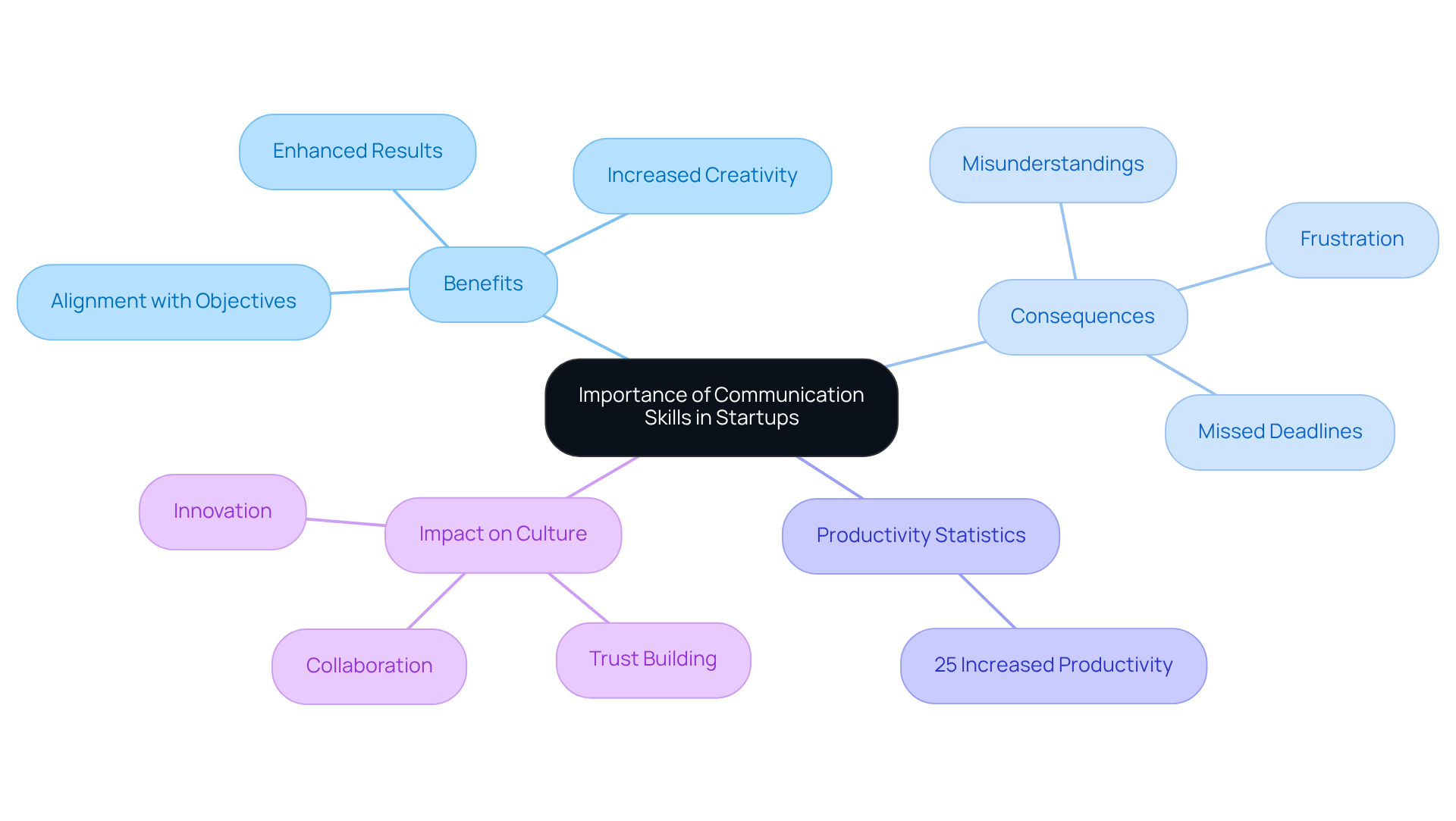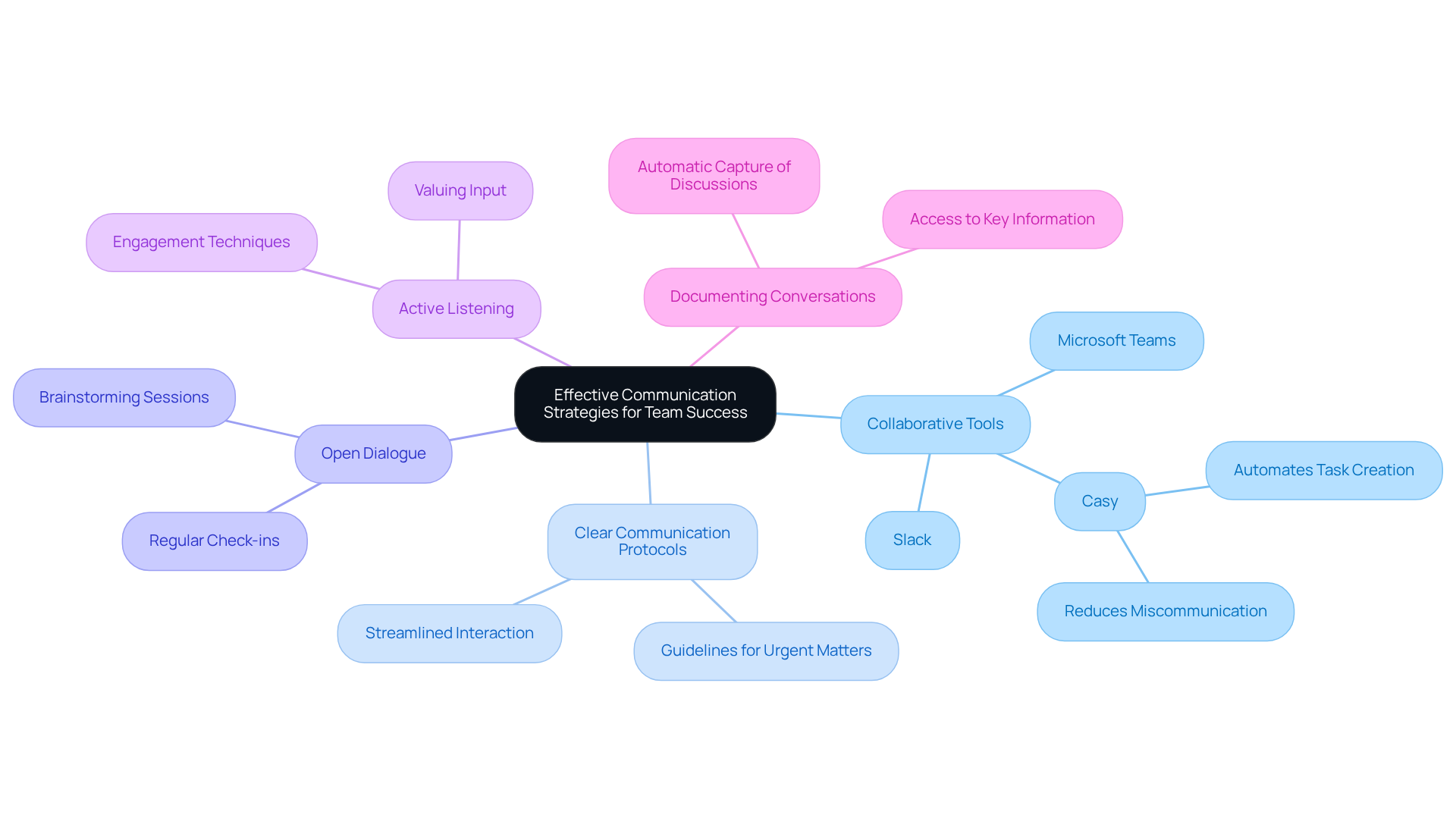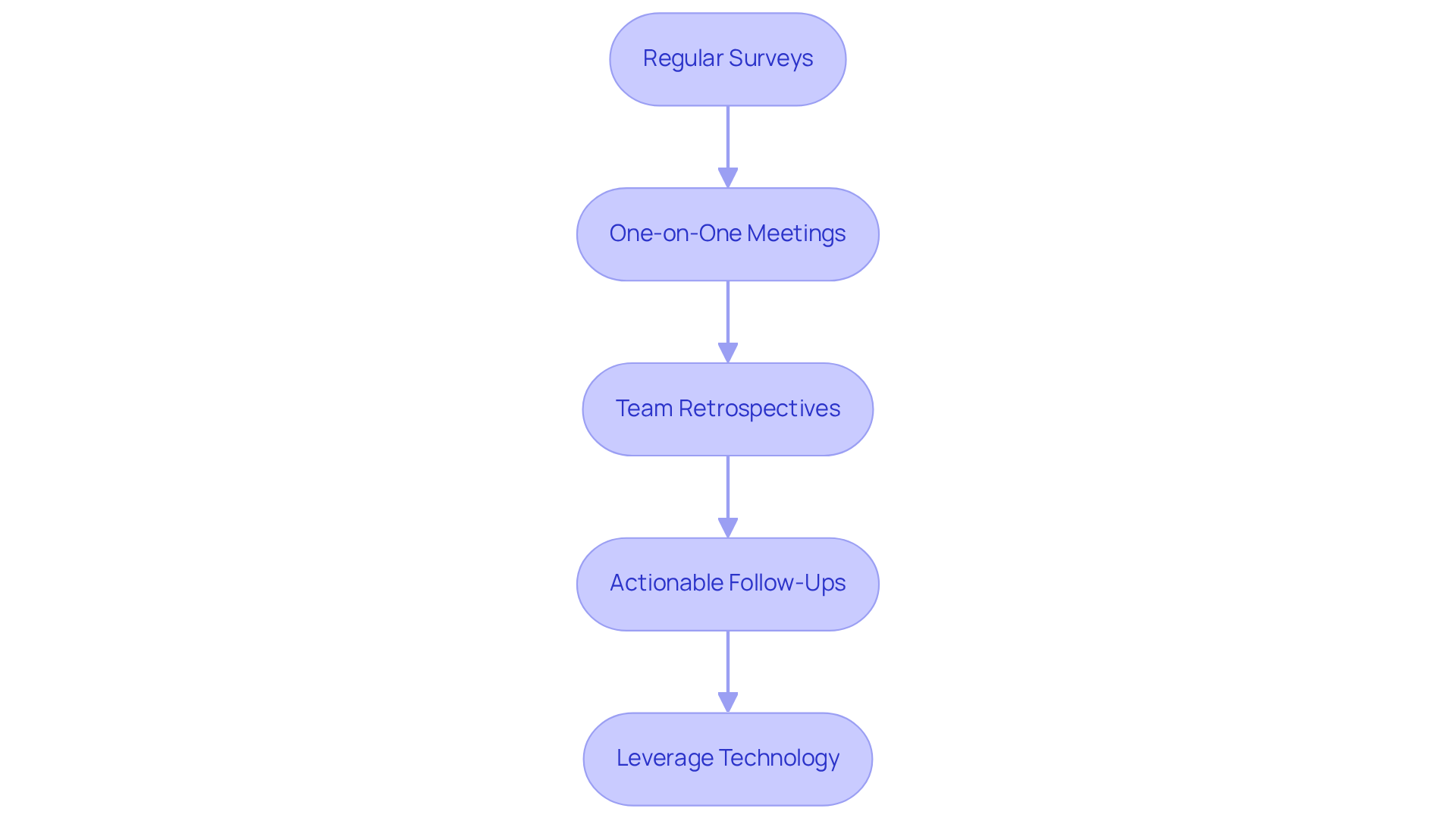Overview
Effective communication skills are essential for the success of startup teams. They not only enhance collaboration but also align project objectives and foster a culture of innovation. Startups that implement strong communication practices can boost productivity by an impressive 25%. Furthermore, building trust is crucial for navigating challenges and achieving long-term success.
How can your team leverage communication to overcome obstacles and drive growth? Emphasizing these skills is not just beneficial; it is vital for thriving in today’s competitive landscape.
Introduction
In the fast-paced world of startups, where innovation and agility reign supreme, the ability to communicate effectively can either propel a team to success or lead to its downfall. Strong communication skills streamline project execution and foster a culture of collaboration and creativity—both essential for navigating the challenges posed by limited resources. Yet, many startups face communication breakdowns that result in misunderstandings and missed opportunities.
How can emerging businesses leverage the power of effective communication to enhance team dynamics and drive success?
Understand the Importance of Communication Skills in Startups
In the entrepreneurial environment, where groups frequently operate under strict time constraints and limited resources, improving communication skills becomes essential. Efficient interaction is essential for improving communication skills, ensuring that all group members align with project objectives, understand their responsibilities, and can share ideas openly. Conversely, inadequate communication can lead to misunderstandings, frustration, and diminished motivation among team members, resulting in repeated efforts and missed deadlines—outcomes that can jeopardize a new business's success. By prioritizing interpersonal skills, new ventures can cultivate an atmosphere of openness and collaboration, ultimately leading to improving communication skills, enhanced results, and fostering creativity.
Consider this: studies indicate that groups employing effective communication methods are 25% more productive. This statistic underscores the necessity for new businesses to invest in improving communication skills among their members. Furthermore, the transparent conveyance of an enterprise's vision, values, and objectives strengthens connections with investors and clients, enhancing overall success. Startups that promote robust internal dialogue are more likely to thrive, as they build trust and encourage innovation, ultimately creating a unified culture capable of navigating growth and change.

Implement Effective Communication Strategies for Team Success
To enhance interaction within startup groups, consider implementing the following strategies:
-
Utilize Collaborative Tools: Leverage platforms like Slack or Microsoft Teams to facilitate real-time communication. These tools enable quick exchanges of ideas and updates, significantly reducing the need for lengthy email threads. Moreover, Casy can automate task creation and updates, effectively addressing the pain points of manual updates and miscommunication, which contributes to improving communication skills by ensuring that key information from conversations is captured without manual input.
-
Set Clear Communication Protocols: Establish guidelines for how and when to communicate. For instance, define which channels to use for urgent matters versus routine updates, streamlining interactions and minimizing confusion.
-
Encourage Open Dialogue: Cultivate an atmosphere where group members feel at ease sharing their ideas and input. Regular check-ins and brainstorming sessions can facilitate this, promoting a culture of innovation and collaboration.
-
Practice Active Listening: Encourage group members to engage in active listening, ensuring that everyone feels valued and understood. This practice can lead to more open dialogue and innovative ideas.
-
Document Conversations: Use tools like Casy to automatically capture key discussions and decisions made during meetings. This ensures that everyone has access to the same information and can refer back to it as needed, reducing the risk of miscommunication and enhancing productivity.
By applying these strategies, new businesses can foster a more unified and communicative work atmosphere, ultimately contributing to improving communication skills, productivity, and achievement.

Establish Feedback Loops to Enhance Communication Effectiveness
Creating feedback loops is essential for enhancing interaction effectiveness within startup teams. To implement these loops, consider the following actionable steps:
-
Regular Surveys: Conduct anonymous surveys to gather insights on interaction practices. This method can uncover areas requiring enhancement, as 86% of employees cite inadequate interaction as a significant cause of workplace failures. By addressing these issues through feedback loops, startups can mitigate the risks associated with ineffective communication.
-
One-on-One Meetings: Arrange regular one-on-one check-ins between team members and managers to discuss interaction challenges and successes. This personalized interaction can yield valuable insights and foster stronger relationships. Notably, managers account for 70% of the variance in employee engagement, according to a Gallup study, underscoring the importance of these meetings in enhancing both engagement and interaction.
-
Team Retrospectives: After completing projects or sprints, hold retrospectives to evaluate which communication strategies were effective and which need refinement. This collaborative reflection encourages a culture of continuous improvement and adaptability.
-
Actionable Follow-Ups: Ensure that input is not only collected but also acted upon. Develop an action plan based on the feedback received and communicate these changes to the team. This reinforces trust and demonstrates a commitment to enhancing communication. Furthermore, establishing a psychologically safe environment for input can help overcome resistance and promote open dialogue.
-
Leverage Technology: Utilize modern HR tech platforms and tools to facilitate smooth communication exchanges. This can enhance the efficiency of response cycles and ensure that evaluations remain data-driven and impartial.
By establishing these feedback mechanisms, startups can consistently improve their communication methods, leading to enhanced collaboration and productivity. Organizations that adopt structured feedback processes often experience increased innovation and leadership effectiveness, ultimately driving long-term success.

Conclusion
Improving communication skills within startup teams is not merely beneficial; it is essential for achieving success in a competitive landscape. By prioritizing effective communication, startups can align team members with project goals, foster collaboration, and create an environment where innovation thrives. The emphasis on interpersonal skills significantly impacts productivity and motivation, ultimately steering new ventures toward sustainable growth.
Key strategies include:
- Utilizing collaborative tools
- Establishing clear communication protocols
- Fostering open dialogue
These are crucial in enhancing team interaction. Additionally, implementing feedback loops through:
- Regular surveys
- One-on-one meetings
- Team retrospectives
helps identify areas for improvement and ensures that communication remains effective. These practices not only address current challenges but also cultivate a culture of continuous improvement, vital for navigating the complexities of startup dynamics.
As startups continue to evolve, prioritizing communication will be a defining factor in their success. By investing in these skills and strategies, teams can build trust, enhance collaboration, and drive innovation. Ultimately, the ability to communicate effectively improves team dynamics and positions startups for long-term achievement in an ever-changing market. Embrace these practices to ensure that communication becomes the cornerstone of your startup's culture and success.
Frequently Asked Questions
Why are communication skills important in startups?
Communication skills are essential in startups because they help ensure that all team members align with project objectives, understand their responsibilities, and can share ideas openly. Effective communication can prevent misunderstandings and frustration, which can negatively impact motivation and lead to missed deadlines.
What are the consequences of inadequate communication in startups?
Inadequate communication can result in misunderstandings, frustration, diminished motivation among team members, repeated efforts, and missed deadlines, all of which can jeopardize the success of a new business.
How can improving communication skills benefit startups?
Improving communication skills can cultivate an atmosphere of openness and collaboration, enhance results, foster creativity, and ultimately make startups more productive and successful.
What impact does effective communication have on productivity in teams?
Studies indicate that groups employing effective communication methods are 25% more productive, highlighting the importance of investing in communication skills within startups.
How does transparent communication affect relationships with investors and clients?
Transparent communication of an enterprise's vision, values, and objectives strengthens connections with investors and clients, enhancing the overall success of the startup.
What role does internal dialogue play in the success of a startup?
Promoting robust internal dialogue helps build trust among team members, encourages innovation, and creates a unified culture that can effectively navigate growth and change, increasing the likelihood of success for the startup.




